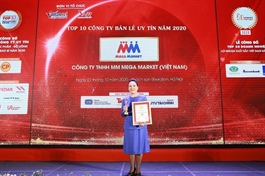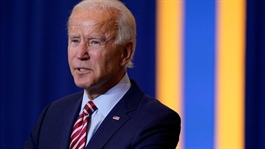Economic reforms will improve resilience after COVID-19: Experts
Economic reforms will improve resilience after COVID-19: Experts
Sustainable development was important for Viet Nam to recover from the impacts of the COVID-19 pandemic, said experts at a forum Monday in Ha Noi.

Participants at the forum held by the Central Institute for Economic Management (CIEM) stated the pandemic had harmed many countries, including Viet Nam, leaving serious consequences for economic development and social stability.
CIEM’s director Tran Thi Hong Minh said Viet Nam was considered one of few countries that were relatively successful in controlling the pandemic and lower the influence to the local economy.
“The close instructions and timely direction of the Government and results from the strong and continuous reforms from before the pandemic have contributed to the improvement of macroeconomic foundations and resilience of the economy," Minh said.
“Post-COVID-19, there will be a higher demand for stronger economic reform, especially ones relating to the new context,” she said, adding: “The basic requirement is to continue the improvement of local productivity and competitiveness of the economy of all industries and of businesses."
The director said Viet Nam must step up reforms to promote digital transformation and implement the sustainable development agenda to drive economic development.
Agreeing that after COVID-19, reform was needed, Tran Tho Dat, Chairman of the Council of the National Economics University, said Viet Nam should build capacity to meet international standards, promote investment co-operation and take the initiative for sustainable development.
“The improvement of labour productivity in the context of the digital economy is very necessary for the current context," he said.
Nguyen Thi Thu Trang, director of the WTO Center (VCCI), said that Viet Nam participated in many new-generation free trade deals recently with commitments in sustainable development which could affect the economy and businesses.
Trang said implementing sustainable development would be the guarantee for a sustainable future of the Vietnamese economy and ensure the economy's reputation in international trade, attracting sustainable investment.
“The sustainable development will encourage local businesses to make green goods to access large markets and serve more potential customers and partners," she added.
According to the 'Asian Development Outlook 2020 Update Report' of the Asian Development Bank two months ago, Viet Nam's GDP was expected to increase by 1.8 per cent in 2020 and 6.3 per cent in 2021, while GDP in Asia will decline by 0.7 per cent in 2020, and increase by 6.8 per cent in 2021.
With this growth rate, the bank said Viet Nam was forecast to have one of the top growth rates in East Asia and the Pacific next year. Viet Nam could have a growth rate higher than the average rate of new emerging economies of the regions and only behind some economies like China and Malaysia with rates of 6.9 per cent each.
Le Duy Binh, managing director of Economica Vietnam said: “Viet Nam's growth rate also depends on the ability to maintain and grow domestic demand.”
“There are many favourable factors to maintain and enhance domestic supply capacity. The pandemic is still well controlled while the stable macroeconomics, monetary and financial operations and efforts to reform the business and investment environment are still underway," he said.
“The pandemic has not been controlled in some major markets of Viet Nam such as the US while it is returning in the EU. Some industries in the country are still in a waiting mode, especially tourism, aviation, resort real estate, restaurants, and food and beverage services," he added.
In addition, the pandemic had influenced some foreign direct investment projects due to foreign restrictions stopping experts, engineers, technicians and skilled workers from entering the country, said Binh.
Pham Dinh Thuy from the General Statistics Office (GSO) said the number of businesses which received support from the Government was too small compared to the request.
“Though the Government has launched support packages to revive businesses and the economy, the less than 18 per cent of enterprises have received the support," he said.
“The larger the enterprises, the bigger the impact they must suffer from the pandemic. State-owned enterprises are the least affected while enterprises with foreign investment are most affected," he added.
The GSO official said while 72.7 per cent of enterprises needed loans to recover from the negative impact, 85.5 per cent of those who needed them faced difficulties in accessing loans. He proposed giving more credit support at low interest for the businesses for two or three years.
Other experts said it was necessary to cut costs created by policies, create more economic space and innovation motivation for businesses and continue to integrate with free trade agreements.



























